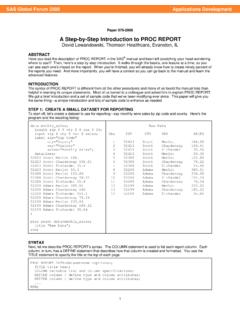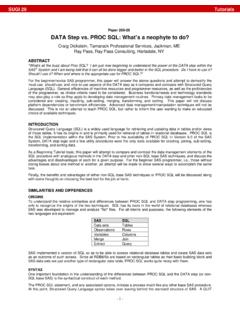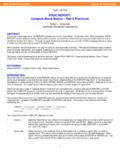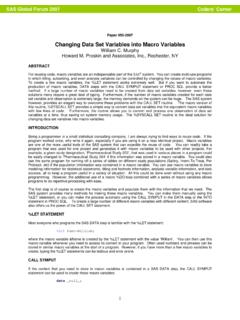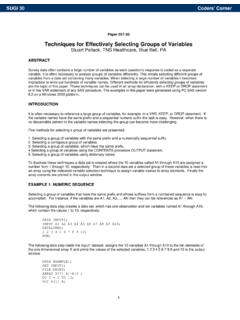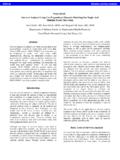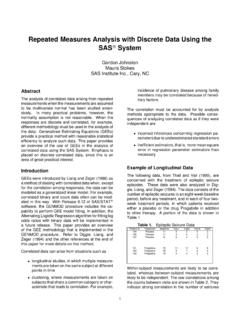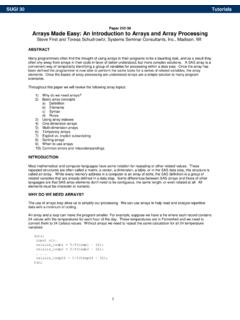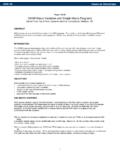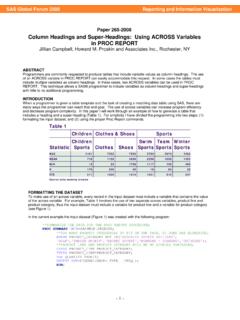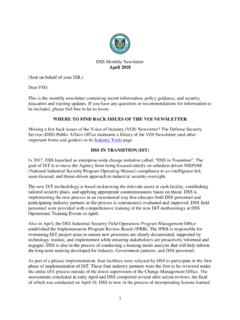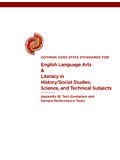Transcription of 133-29: Assessing SAS Skill Level During the Interviewing ...
1 1 Paper 133-29 Assessing SAS Skill Level During the Interviewing Process Jenine Eason, , Atlanta, GA Assessing SAS Skill Level During THE Interviewing PROCESS This paper will provide guidelines and tools that will assist in Interviewing a candidate for a SAS programming position, even for the non-programming interviewer. Skill Level categories will be defined: Beginner, Intermediate, and Advanced. Specific Interviewing approaches, suggested topics, questions and tests will be explored. We ll also cover tactics to get the right candidates to apply in the first place. INTRODUCTION Interviewing is usually one of those things that many people would prefer not to do; whether you are the interviewer or the interviewee.
2 It requires a lot of mental effort for both sides. There is little or no opportunity to practice on either side without being involved in a true interview. You are either in the situation of needing the perfect new employee or wanting a new job. In the technical world, being the interviewer is usually not one of the skills that we had been hired for in the first place. Frequently for a technical person, Interviewing doesn t always come naturally and requires specific effort to be successful. Having a basic predetermined approach to the interview process can yield the required results. Not having an approach will lead to misleading information, a vague interpretation of abilities, and be a waste of time for both parties.
3 Having a solid Interviewing game plan will provide a better sense of control and confidence. We will consider the approach from a technical perspective and leave other human resource needs and compatibility issues for another discussion. A certain amount of research is required prior to conducting an interview. Within this research, a set of skills should be outlined. A Level of competency needs to be determined for each desired Skill . Flushing this information out will provide great guidelines for Assessing the Skill Level you require. KNOW WHAT KIND OF CANDIDATE IS REQUIRED Is industry experience the top most consideration? Is statistical savvy unimportant, but Skill with ODS a must?
4 Which operating systems are required? Or, is this not a crucial point. Knowing which skills are essential, which are not, and which only require general competency is of the utmost importance when conducting a technical interview. Having these skills and expertise levels well defined will allow the interviewer to weed out lacking resumes, bring in the right candidates in the first place, and devise the right set of questions to ask. If you re Interviewing for a position that is isolated without other SAS programmers or the project is a startup, you may need a candidate with considerable experience. On the flip side, you may have a real stable programming team on a stable project. In this case, someone with intermediate skills or even a beginner may be ideal.
5 The team can teach and build the skills of a lesser learned candidate. Basic understanding of such environments is absolutely crucial. HOW TO GET THE RIGHT CANDIDATES What s the best way to avoid wasting time Interviewing ? The answer is: get the best candidates to apply. It sounds simple, but it is not always easy to do. Of course, the basic job market climate in a certain region has a big part to play in the search. This matter is for the most part, out of your hands. But there are things you can do, as a hiring manager, to make this situation as unaffecting as possible. The number one way to find the best candidates to interview is by networking. If you have an open position, let everyone you know in the field aware of what you are looking for.
6 No one wants to look bad based on a recommendation. Even someone you don t care much for is likely to only send viable candidates your way. Better programmers tend to know other good workers. One must get the job posting out to as many eyes as possible and to the best markets. Investigate which internet job posting websites are most popular, not only in your region, but for the technically savvy. Using a job placement firm is a way to save time. A good placement company will do a lot of the screening up front saving you considerable time Interviewing unworthy candidates whether it is based on financial needs, abilities, or logistics. They will usually place ads in the most effective locations.
7 SUGI 29 Planning, Development and Support 2 Filtering through resumes can limit the field. Focusing on key words and phrases before delving into details can quickly bring forward the most appropriate candidates. Yes, occasionally you get a resume for a SAS position and the word SAS is no where to be found. There is no sense reading further for other basic requirements. Even using the best of the above suggestions, having a well written job description will be the second biggest way to get the right candidates. Great care needs to go into every word of the description. Be very clear which skills are required. Don t be ambiguous in regards to which skills are preferable but not necessary.
8 Leaving too much up to interpretation will have too many inappropriate candidates vying for an interview and you ll end up with a bewildering mess of resumes to review. A description that is too stringent might ward off very viable candidates. Minimum experience requirements, specific skills and education Level minimums should be very clear. This task, done well, will deter many candidates that are unqualified from applying in the first place. If possible have someone else review the job description to determine if the correct job is being conveyed. Having flushed out such needs will also help prepare the interviewer in developing questions to be used During the interview. TYPES OF INTERVIEWS There are two types of technical interviews: the phone interview and the face-to-face interview.
9 Both have their advantages and disadvantages. Meeting a person face-to-face gives a lot more opportunity to assess their skills . The candidate obviously brings to the interview only what they have in their head. The visual aspect can be very enlightening. Confusion, confidence, and comfort with questions are harder to hide in person. Time permitting, programming tests can easily be administered During a face-to-face interview. There are disadvantages to a face-to-face interview. If you are going to the effort of bringing in a candidate for an interview, it s likely that you will have this person interview with multiple people. Unless the person is a referral, you don t know anything more about the candidate than what is in his/her resume.
10 You run the risk of wasting the time of multiple people with a candidate that could be quickly eliminated. Only in rare cases is a phone technical interview anything more than a screening. It allows the interviewer a chance to assess more candidates than in the face-to-face interview and doesn t have to involve as many people. This is indeed its biggest advantage. Phone interviews tend to take less time but can not cover quite as many areas. Obviously written tests or code review are not really options in this case. This can be overcome with a good set of questions that can be easily answered over the phone. A thorough search through phone interviews may lead to many potential candidates.
